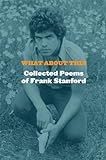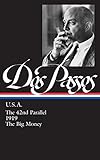Last year I couldn’t go to bars because of a virus; this year I can’t because of a toddler. The vaccines work. Go get one—or better yet three—so you can safely grab a drink for me.
At home I made do. This was a year of incrementalism. Most nights after bedtime, I had a routine: 25 pages of poetry plus 50 pages of fiction or non. There were periodicals but they weren’t the priority; many nights I took my sieve to Twitter’s stream and I prospected. I lost a lot of time to TikTok.
 Fortunately, incrementalism is another word for progress. Incrementalism was good for 15,000 pages this year—it was a giant killer, even if it didn’t feel like it at the time. Slowly I took down big tomes by Louise Glück (Poems 1962-2012), Paul Celan (Memory Rose into Threshold Speech), Frank Stanford (What About This?), John Dos Passos (U.S.A.), and William Gaddis. (Fitting, that last one: like Wyatt and his original paintings, I haven’t finished The Recognitions, but I’m far enough along to know that Adam Mars-Jones missed the point in his review for The London Review of Books. The length and overstuffing of The Recognitions are features, Adam, not bugs. Saying it should be shorter is like saying Magic Eye illustrators should draw simple sailboats.)
Fortunately, incrementalism is another word for progress. Incrementalism was good for 15,000 pages this year—it was a giant killer, even if it didn’t feel like it at the time. Slowly I took down big tomes by Louise Glück (Poems 1962-2012), Paul Celan (Memory Rose into Threshold Speech), Frank Stanford (What About This?), John Dos Passos (U.S.A.), and William Gaddis. (Fitting, that last one: like Wyatt and his original paintings, I haven’t finished The Recognitions, but I’m far enough along to know that Adam Mars-Jones missed the point in his review for The London Review of Books. The length and overstuffing of The Recognitions are features, Adam, not bugs. Saying it should be shorter is like saying Magic Eye illustrators should draw simple sailboats.) 

 Anyway, I read other books more quickly. At no point in In Patagonia does Bruce Chatwin take his foot off the gas. The closing sentences throughout Amparo Dávila’s The Houseguest are what stories should be. I didn’t read a more satisfying chapter of anything this year than chapter 33 of Jung Yun’s O, Beautiful (“Rules seem so arbitrary here. Just small demonstrations of power by people who have very little, used against people who have even less”), but if we’re talking poetry I have to shout out P. Scott Cunningham’s piece in Islandia, Vol. 1 about love, life, and 2 Fast 2 Furious. I have to shout out Andrew Hemmert for how he described shoveling dead rats in the wall like “strange soft coal” in Sawgrass Sky. Brilliance abounds.
Anyway, I read other books more quickly. At no point in In Patagonia does Bruce Chatwin take his foot off the gas. The closing sentences throughout Amparo Dávila’s The Houseguest are what stories should be. I didn’t read a more satisfying chapter of anything this year than chapter 33 of Jung Yun’s O, Beautiful (“Rules seem so arbitrary here. Just small demonstrations of power by people who have very little, used against people who have even less”), but if we’re talking poetry I have to shout out P. Scott Cunningham’s piece in Islandia, Vol. 1 about love, life, and 2 Fast 2 Furious. I have to shout out Andrew Hemmert for how he described shoveling dead rats in the wall like “strange soft coal” in Sawgrass Sky. Brilliance abounds.
Before this year, I typically read one book at a time. Now I alternate, and I find the trick is to switch from one kind to another: chip away at the long ones while flying through the shorts. The momentum of the latter propels you through the former. It’s just one of those things, like how slicing your sandwich in half makes lunch more filling.
Leaping book to book (or app to book) was also self-preservation, if I’m being honest. One way I cope with intense stress is by minimizing the time I spend thinking about it. They say sharks drown if they stop swimming. If you’re lucky, art can be an escape.
But the bars, right? I miss them. I miss reading in places where a $100 tab would kill a man. I miss guys who rip filters off their cigarettes instead of paying more for unfiltered packs. I don’t miss guys wearing too much cologne but I miss one-eyed bartenders. I miss the way guys trade stories like they’re farts: things their perpetrators appreciate most. So I’ve gone in search of these moments—albeit from my couch.
I began by watching Bloody Nose, Empty Pockets in my living room. What a flick. Great dives insulate customers from the terrors of reality, and especially the reality of capitalism—until they don’t. (Sip whiskey while watching so you know you’ve still got your senses of taste and smell.)
Ever after, I kept track of lines that scratched my itch. What follows is an amalgamation, or a mixtape of drunken hits. Together they shape a scene. As you read, if the line does something for you, click the (number) after it and buy the book. Fair is fair, so remember to tip your bartender.
“I was on a gin-fueled hunt for big asses and music I could cry to.” (1) “Drunk and/ wandering like a dog through the/ supermarkets of the night,” (2) “Thick beads of sweat run like lizards down my chest and armpits.” (3) “[I] arrived at a room full of people who spent their lives in rooms.” (4) “The first thing [I] notice[d] … [was] that it smell[ed] like too many things. Cleaning chemicals, body odor, fryer grease, popcorn, and stale beer.” (5) “For once/ my anonymity made me feel serene./ Amid half-murmured intros, volleyed/ glances, conversation of car keys and shot/ glasses, I knew I liked this place just like I knew// I’d never see my crew in here.” (6) “The days have gone into the ground/ Like rainwater strangers wipe from their eyes/ when they meet again/ in these drinking places.” (7) “God is on a beer run./ Jesus and Mary argue/ about who’s driving/ them home. Eve’s/ phone is dead.” (8) “Who should be pouring drinks there [at the bar] but a young woman whose name I can’t remember. But I remember the way she poured. It was like doubling your money.” (9) “She is sad from sipping the flat beer/ of her own voice.” (10) “I had two doubles and immediately it was as if I’d been dead forever, and was now finally awake.” (11) “[I] shut [my] eyes like [I’m] losing or finding God.” (12) “The whisky was hotsweet in [my] mouth, buzzed like bees in [my] ears.” (13) “Another beer? [I] started to decline, then noticed the mirror behind the bar, and watched [my]self accept.” (14) “I think I’ll stay up late with a few bandits/ of my choice and resist good advice.” (15) “All around [us] men drank alone, staring out of their faces.” (16) “I tried to eavesdrop on other conversations. It was impossible. I could only hear the odd word … words that meant nothing yet conveyed the infinite vulgarity and hopelessness of my compatriots.” (17) “There is a certain type of conversation one hears only when one is drunk and it is like a dream, full of humor and threat and significance, deep significance. And the way one witnesses things when one is drunk is different as well. It is like putting a face mask against the surface of the sea and looking into things, into their baffled and guileless hearts.” (18) “They were enjoying their discussion very much, each finding the other intelligent, witty, in all, a good companion, for neither was listening to what the other was saying.” (19) “Time passed, and some of it became this.” (20) “I walk around carrying [my great grandmother]—a swallow/ of whiskey waiting, holding it// like the water that refuses/ to dissolve on my tongue// because it is my tongue already.” (21) “I drink wine like a city.” (22) “When I drink wine I drink an ocean.” (23) “I swallowed and the wine became a warming stream that trickled down my throat. This warmth spread outward, into my chest—it felt like a warm little bomb splashing in my heart, sending shockwaves through the blood.” (24) “I have built myself/ a safer body, covered the rot with rot.” (25) “These days I raise a glass to make sure it’s empty.” (26) “In those days I took the purest joy in the art of remotion, in acts of singular and simple economy: [drinking] alone, eating alone, reading, walking, and doing these same things day after day.” (27) “There were many moments in [this bar] like that one—where you might think today was yesterday, and yesterday was tomorrow, and so on. Because we all believed we were tragic, and we drank.” (28) “We are a society drinking at our own wake, but … we look good doing it.” (29)
More from A Year in Reading 2021 (opens in a new tab)
Do you love Year in Reading and the amazing books and arts content that The Millions produces year round? We are asking readers for support to ensure that The Millions can stay vibrant for years to come. Please click here to learn about several simple ways you can support The Millions now.
Don’t miss: A Year in Reading 2020, 2019, 2018, 2017, 2016, 2015, 2014, 2013, 2012, 2011, 2010, 2009, 2008, 2007, 2006, 2005
The post A Year in Reading: Nick Moran appeared first on The Millions.
Source : A Year in Reading: Nick Moran












